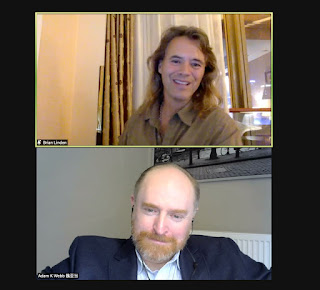On November 4th, Co-Director Adam Webb hosted a discussion with HNC ’88 alumnus Brian Linden, the co-founder of the Linden Centre in Xizhou, China. This event was an excellent opportunity to hear Brian Linden introduce his forthcoming book, Redefining Diplomacy: One Village at a Time, and to hear about his fascinating life as he became interested in China and the Hopkins-Nanjing Center. Brian Linden was part of the HNC's second cohort. His book traces what he describes as an “unlikely journey from working-class America to China.”
Brian had put himself through community college through cleaning carpets: “I would rush every morning to the grocery store and rent a carpet cleaning machine, put it in the back of a van, and go out and clean carpets."
One day in 1983, in Chicago, he cleaned the carpets of a house for a University of Chicago professor, who owned a very large world map. Every place the professor had visited was marked with a red flag, such as Europe and Mexico. After about an hour of cleaning, the professor asked Brian for a favor - “Hey buddy, could you put this flag in China? I just got back from China.” Brian continued by saying, “in 1983, very few people were traveling to China,” so the professor was very proud to have had this opportunity. However, Brian apologetically told the professor he could not do it because he did not know where to find China on the map. After discovering that Brian was not joking, the professor sat down with Brian, and for the first time in Brian’s life, “someone educated” questioned him about his life choices.“He said, is this all you want to do for the rest of your life, clean carpets? I told him I do not have many options right now; I am going through night school trying to make it.”
The moment he had with the professor was the beginning of his journey to China. A month later, while attending night school at Northeastern Illinois University, he saw a poster advertising a scholarship to study in China. Brian applied and two months later received a call from the Chinese Embassy inviting him to study at Beijing University. Brian could not believe that they had chosen him to participate and asked, “Why? Did anyone else apply?” He had told them that he did not know anything about China, and they said it was precisely for that reason they chose him. They were looking for people like Brian, who were enthusiastic to learn about China.
After arriving in Beijing in 1984, Brian never attended a class at Beijing University because on the second day, he was sought out by a Beijing film studio company looking to cast a foreigner as a lead actor - one of the first movies since 1949 to do this. The movie took three months, and then he was interviewed by CBS news, who later offered him a job.
He first heard about the Hopkins-Nanjing Center during a talk when he was with CBS News and was amazed by the HNC, specifically, that it was the first program in China where international students could live and attend class with a Chinese roommate.
“I would never have been to the HNC…My life would have been completely different had it not been for that professor at the University of Chicago, had it not been for the gratitude, and I mean the graciousness of the Chinese Embassy giving me the scholarship and for everyone who has kind of, in some ways, given me opportunities that were no way commensurate with my pre-China background. So, ever since then, I evolve to in some way, express gratitude to China.”
I could not help but be captivated by Brian's story. During his time at CBS, he interviewed Deng Xiaoping and other Chinese national figures. In 1987-1988, he spent a year completing the HNC certificate program, and then returned to the US and attended Stanford University, where he obtained a Master of Arts in Asian history. He stayed in America for 15 years until 2004, after which he moved back to China with his wife Jeanee and their two sons. His goal was to build a rural retreat for actual cultural exchange between visitors and local people in China. After spending an itinerant two years seeking a site, they eventually settled in Xizhou, near Dali in Yunnan Province, and so in 2008, the Linden Centre was founded.
Brian and Jeanee were very much inspired by Brian's emotional connection to China. Having respect for the country, he was hoping to build a platform that would enhance China’s soft power and allow people to see China in a slightly different manner through integration with local Chinese villages and communities. All the staff in the Linden Centre are from the local community. There are free tours and workshops that the visitors can participate in to connect with the community. One example is an architecture tour that allows people to understand the importance of the local community’s buildings to the region’s culture. In a workshop, local people can share their hobbies with the guests. As a result, 50% of the buildings are public spaces for learning and interaction. Staying at the Centre is a cultural and educational experience.
Brian dedicates his upcoming book, which will be published in Chinese, to the Chinese people. It is “in many ways, a love story about a person whom this country has enchanted, and it talks a little about that, and how I feel I am such a better person because of China.” I think many HNC students feel the same sentiments as Brian, as many of us feel a significant connection with China while we study at the Hopkins-Nanjing Center and share an unforgettable, rich bicultural and bilingual learning space.
Listen to the entire chat here: https://www.youtube.com/watch?v=UKjiupXhvlw
Written by Elizabeth Gonzales



